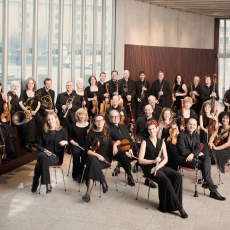Berlioz Symphonie Fantastique - SCO & Ticciati - ClassicsToday.com
Artistic Quality: 8
Sound Quality: 10
This performance has a lot going for it. Conductor Robin Ticciati gets playing of near miraculous transparency and finesse from the Scottish Chamber Orchestra. It's worth remembering in this connection that the orchestra of the Symphonie fantastique is actually pretty modest for the first three movements: no heavy brass, no percussion save timpani, the addition of harps only in the second movement, and so on. In the March to the Scaffold, Ticciati makes sure that the pedal tones of the trombones really growl, but Berlioz' carefully graded dynamics are always observed. As regards the absolute size of the forces required to pull this off, I'm convinced, and the top-notch SACD sonics certainly help to make the case.
Less impressive is the finale, despite some pretty terrific woodwind playing at the start. Here, the problem isn't so much weight, but a lack of atmosphere and, well, insanity. The tubas and bassoons sound too smooth in the Dies irae parody, the bells too tinny, and Ticciati's pursuit of clarity seems to tame the music (and slow it down), despite the undoubted technical merit of the playing as such. To get an idea of what I am talking about, I offer a brief sample of the fugato following the Dies irae episode so that you can judge for yourself. The movement lacks both parodistic edge and scariness, and it really should have both.
Ticciati's grace and precision are fully in evidence in this exceptional version of the overture to Béatrice et Bénédeict, a work that Tovey wittily described as "Much Ado About Nothing without the ‘Ado.'" Conceptually, these performances recall Paavo Järvi's Beethoven: playing of such astonishing virtuosity and transparency that you may either be left gasping in admiration, or wondering where the music went. In the Beethoven cycle, the approach tended to work (or not) in individual works. Here it's more a question of individual movements, but you get the picture.


